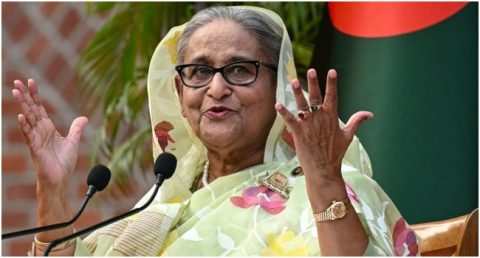Bangladesh PM Hasina Flees Country, Military Takes Over
Latest Headlines, World News Monday, August 5th, 2024
(AFRICAN EXAMINER) – Bangladeshi Prime Minister Sheikh Hasina’s 15-year rule ended on Monday as she fled weeks of deadly protests and the military announced it would form an interim government.
Hasina had sought since early July to quell nationwide protests against her government but she fled after a brutal day of unrest on Sunday in which nearly 100 people were killed.
Bangladesh’s army chief General Waker-Uz-Zaman said in a broadcast to the nation on state television on Monday Hasina had resigned and the military would form an interim government.
“The country has suffered a lot, the economy has been hit, many people have been killed — it is time to stop the violence,” Walker said, dressed in military fatigues.
“I hope after my speech, the situation will improve,” he said.
The career infantryman said he would talk to the president to form a caretaker government in the South Asian nation of some 170 million people. It was not immediately clear if he would lead it.
Waker said he had held talks with the main opposition parties and civil society members but not Hasina’s Awami League.
Hasina, 76, fled the country by helicopter, a source close to the leader told AFP shortly after protesters had stormed her palace in Dhaka.
The source said she left first by motorcade but was then flown out, without giving her destination.
ubilant crowds had waved flags, some dancing on top of a tank in the streets on Monday morning before hundreds broke through the gates of Hasina’s official residence.
Bangladesh’s Channel 24 broadcast images of crowds running into the compound, waving to the camera as they celebrated, looting furniture and books, with others relaxing on beds.
The military declared an emergency in January 2007 after widespread political unrest and installed a military-backed caretaker government for two years.
Hasina then ruled Bangladesh from 2009 and won her fourth consecutive election in January after a vote without genuine opposition.
Her government was accused by rights groups of misusing state institutions to entrench its hold on power and stamp out dissent, including through the extrajudicial killing of opposition activists.
Demonstrations began over the reintroduction of a quota scheme that reserved more than half of all government jobs for certain groups.
The protests escalated despite the scheme having been scaled back by Bangladesh’s top court.
Soldiers and police with armoured vehicles in Dhaka had barricaded routes to Hasina’s office with barbed wire on Monday morning but vast crowds flooded the streets, tearing down barriers.
The Business Standard newspaper estimated as many as 400,000 protesters were on the streets but it was impossible to verify the figure.
“The time has come for the final protest,” said Asif Mahmud, one of the key leaders in the nationwide civil disobedience campaign.
In several cases, soldiers and police did not intervene to stem Sunday’s protests, unlike during the past month of rallies that repeatedly ended in deadly crackdowns.
Respected former army chief had earlier demanded the government “immediately” withdraw troops and allow protests in a hugely symbolic rebuke of Hasina.
“Those who are responsible for pushing people of this country to a state of such extreme misery will have to be brought to justice,” ex-army chief General Ikbal Karim Bhuiyan told reporters Sunday.
Related Posts
Short URL: https://www.africanexaminer.com/?p=97155






















